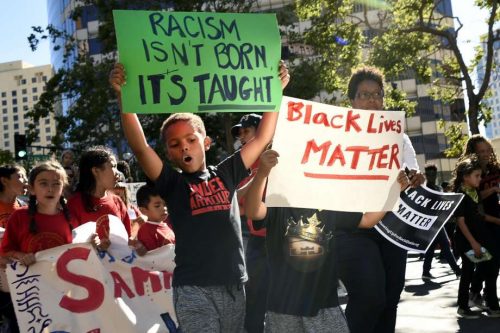Show Solidarity with Words & Actions

KADEN PAGANI, 8, LEFT, AND HIS BROTHER KINGSTON, 6, CARRY SIGNS AS THEY MARCH DOWN BROADWAY TOWARD FRANK OZAWA PLAZA DURING A BLACK LIVES MATTERS PROTEST IN OAKLAND ON THURSDAY, JULY 21, 2016. IMAGE BY MICHAEL SHORT.
“Your Silence will not protect you”Audre Lorde calls for our silence to be transformed into language and action in her 1977 speech. But if our silence will not protect us, then why do we hold on to it for comfort? Why do revert to silence when we witness, see and read about the injustices and cruelty of this world? Why do we let fear take over? Why do we let compliance sink in?
There are many reasons for silence. But I am not looking to hear reasons and excuses for your silence or lack of action. I am here to tell you that while educators dominate the Twitter-sphere with their skyrocketing number of tweets, only a small fraction of those tweets are dedicated to discussions on racism, social justice, inequity, Islamophobia, homophobia and prejudice. Conversations are happening, but they’re a very minor, and often times you see them in spaces where people of colour have already paved the way for them, such as on #EduColor and #SoJustEdu.
Pew Research Centre published survey results on social media conversations about race. According to the survey, “two of the most used hashtags around social causes in Twitter history focus on race and criminal justice: #Ferguson and #BlackLivesMatter”.
So then why are educators so silent when it comes to race conversations?
According to Pew Research Centre’s survey, “roughly two-thirds (67%) of whites who use social media say that none of things they post or share pertain to race”. Why are Twitter’s most dominant users silent on issues that concern the very youth who are driving these conversations online? How can Show Solidarity with Words & Actions | The Jose Vilson:
